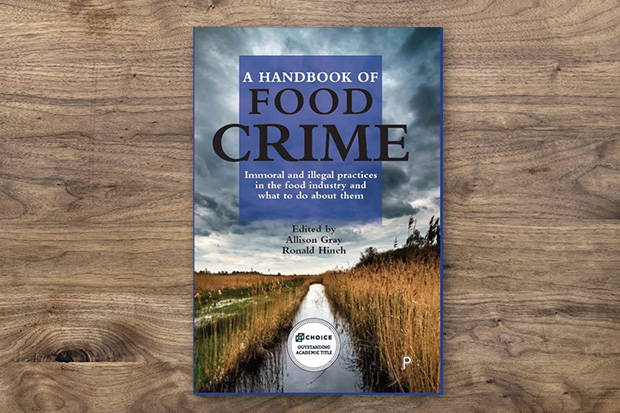The relationship between food, climate change and environmental crime
Troubling recipe developed by Professor Emeritus and master’s graduate earns international recognition
January 22, 2019

Food is big business. Everyone needs to eat, so food is always in demand. From agriculture to production to transportation to distribution, an enormous financial infrastructure exists to try and match supply with demand.
University of Ontario Institute of Technology graduate Allison Gray (Master of Arts in Criminology, class of 2014) and Professor Emeritus Ronald Hinch, PhD (Founding Dean, Faculty of Social Science and Humanities) argue the food systems we have in place are not quite as simple or straightforward as one might assume or hope. In fact, the system is extremely complex and often fraught with environmentally and morally harmful, and even criminal consequences.
“Thinking criminologically about food means recognizing that systemic issues are not mere coincidences or weaknesses of our risk-based society,” says Gray.
“Nutritiously-poor, unsafe and fraudulent food, produced through unfair, unjust and dangerous labour, marketed for profit, distributed unevenly, harming ecological systems, is not normal,” says Dr. Hinch. “It is unacceptable.”
To draw attention to issues many people are unaware of, Gray and Dr. Hinch contributed to and edited A Handbook of Food Crime: Immoral and illegal practices in the food industry and what to do about them, an international collection of 24 articles by authors from multiple research disciplines.
The handbook explores the global range of systemic harms, injustices and crimes involving the production, processing, marketing, distribution, consumption and disposal of food. Topics include the use of slave labour in the cocoa industry, deadly salmonella outbreaks, genetic dehorning and unethical care provided to ‘food animals’.
“Food literally invades and builds our bodies and fuels our social livelihoods,” says Gray, who has long-held an interest in the connections between environmental crime and the food industry. “We need to recognize that our intimate consumption practices have global political, social and criminal connections, so we can give ourselves and our environment a ‘helping fork’.”
The editors hope the book provides context on food crime and accelerates time-sensitive efforts to promote sustainable food production practices.
“The United Nations Panel on Climate Change says massive change to global energy practices is needed no later than 2030 to avoid drastic consequences associated with climate change,” say Gray and Dr. Hinch. “Animal agriculture, for example, is a leading contributor to climate change and responsible for as much as half of all greenhouse gas emissions. Meat-free diets could dramatically reduce these amounts.”
After presenting their research findings at various international conferences and publishing an article outlining their foundational theories, Gray and Dr. Hinch received a publication offer from Policy Press in the United Kingdom. The handbook has garnered significant attention, including an Outstanding Academic Title designation from Choice Reviews, the publishing unit of the American Association of College and Research Libraries.
Gray is proud of this groundbreaking achievement.
“Ron was my master’s thesis supervisor. We shared a mission to critically analyze the social and environmental harms and crimes associated with the food industry,” says Gray, now a PhD candidate in Social Justice at the University of Windsor. “As an early-career researcher, my collaborative, editorial and writing role in this book provided an invaluable foundation for my future and made a noteworthy imprint in academia.”
Media contact
Bryan Oliver
Communications and Marketing
Ontario Tech University
905.721.8668 ext. 6709
289.928.3653
bryan.oliver@uoit.ca



